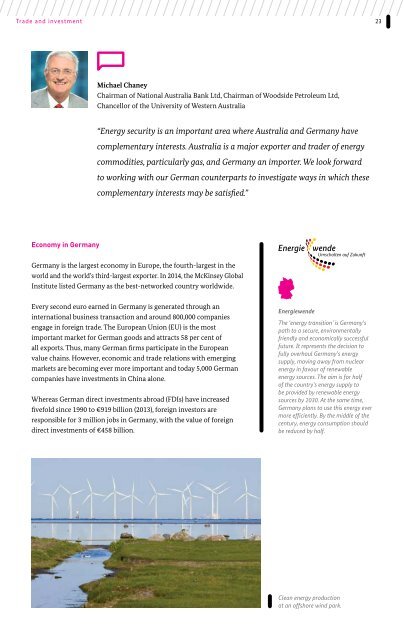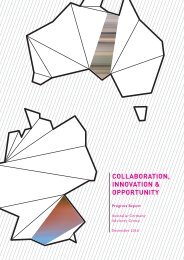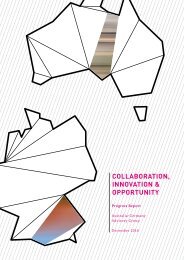A fresh look at links between Australia and Germany
IT IS TIME TO TAKE A FRESH LOOK AT THE LINKS BETWEEN AUSTRALIA AND GERMANY AND BRING OUR RELATIONSHIP INTO THE 21ST CENTURY Five themes guided the Australia-Germany Advisory Group’s work, which aims to give a modern agenda to a long-standing relationship. These are: A INCREASE TRADE AND INVESTMENT · B IMPROVE STRATEGIC DIALOGUE AND COLLABORATION · C STRENGTHEN COOPERATION ON SCIENCE AND EDUCATION · D EXCHANGE ON DIVERSITY, MIGRATION, INTEGRATION AND REFUGEES · E ENHANCE CULTURAL AND SPORTING LINKS, AND COOPERATION ON WINE MAKING. The members of the Australia-Germany Advisory Group believe these recommendations form a strong basis to appropriately broaden, strengthen and deepen the Australia-Germany relationship over the coming five years. We look forward to witnessing the beneficial outcomes which will be achieved for people in both countries and to the deeper friendship and cultural, economic and strategic understanding between Australia and Germany as a result.
IT IS TIME TO TAKE A FRESH LOOK AT THE LINKS BETWEEN AUSTRALIA AND GERMANY AND BRING OUR RELATIONSHIP INTO THE 21ST CENTURY
Five themes guided the Australia-Germany Advisory Group’s work, which aims to give a modern agenda to a long-standing relationship. These are:
A INCREASE TRADE AND INVESTMENT · B IMPROVE STRATEGIC DIALOGUE AND COLLABORATION · C STRENGTHEN COOPERATION ON SCIENCE AND EDUCATION · D EXCHANGE ON DIVERSITY, MIGRATION, INTEGRATION AND REFUGEES · E ENHANCE CULTURAL AND SPORTING LINKS, AND COOPERATION ON WINE MAKING.
The members of the Australia-Germany Advisory Group believe these recommendations form a strong basis to appropriately broaden, strengthen and deepen the Australia-Germany relationship over the coming five years. We look forward to witnessing the beneficial outcomes which will be achieved for people in both countries and to the deeper friendship and cultural, economic and strategic understanding between Australia and Germany as a result.
Create successful ePaper yourself
Turn your PDF publications into a flip-book with our unique Google optimized e-Paper software.
Trade <strong>and</strong> investment23<br />
Michael Chaney<br />
Chairman of N<strong>at</strong>ional <strong>Australia</strong> Bank Ltd, Chairman of Woodside Petroleum Ltd,<br />
Chancellor of the University of Western <strong>Australia</strong><br />
“Energy security is an important area where <strong>Australia</strong> <strong>and</strong> <strong>Germany</strong> have<br />
complementary interests. <strong>Australia</strong> is a major exporter <strong>and</strong> trader of energy<br />
commodities, particularly gas, <strong>and</strong> <strong>Germany</strong> an importer. We <strong>look</strong> forward<br />
to working with our German counterparts to investig<strong>at</strong>e ways in which these<br />
complementary interests may be s<strong>at</strong>isfied.”<br />
Economy in <strong>Germany</strong><br />
<strong>Germany</strong> is the largest economy in Europe, the fourth-largest in the<br />
world <strong>and</strong> the world’s third-largest exporter. In 2014, the McKinsey Global<br />
Institute listed <strong>Germany</strong> as the best-networked country worldwide.<br />
Every second euro earned in <strong>Germany</strong> is gener<strong>at</strong>ed through an<br />
intern<strong>at</strong>ional business transaction <strong>and</strong> around 800,000 companies<br />
engage in foreign trade. The European Union (EU) is the most<br />
important market for German goods <strong>and</strong> <strong>at</strong>tracts 58 per cent of<br />
all exports. Thus, many German firms particip<strong>at</strong>e in the European<br />
value chains. However, economic <strong>and</strong> trade rel<strong>at</strong>ions with emerging<br />
markets are becoming ever more important <strong>and</strong> today 5,000 German<br />
companies have investments in China alone.<br />
Whereas German direct investments abroad (FDIs) have increased<br />
fivefold since 1990 to €919 billion (2013), foreign investors are<br />
responsible for 3 million jobs in <strong>Germany</strong>, with the value of foreign<br />
direct investments of €458 billion.<br />
Energiewende<br />
The ‘energy transition’ is <strong>Germany</strong>’s<br />
p<strong>at</strong>h to a secure, environmentally<br />
friendly <strong>and</strong> economically successful<br />
future. It represents the decision to<br />
fully overhaul <strong>Germany</strong>’s energy<br />
supply, moving away from nuclear<br />
energy in favour of renewable<br />
energy sources. The aim is for half<br />
of the country’s energy supply to<br />
be provided by renewable energy<br />
sources by 2030. At the same time,<br />
<strong>Germany</strong> plans to use this energy ever<br />
more efficiently. By the middle of the<br />
century, energy consumption should<br />
be reduced by half.<br />
Clean energy production<br />
<strong>at</strong> an offshore wind park.





